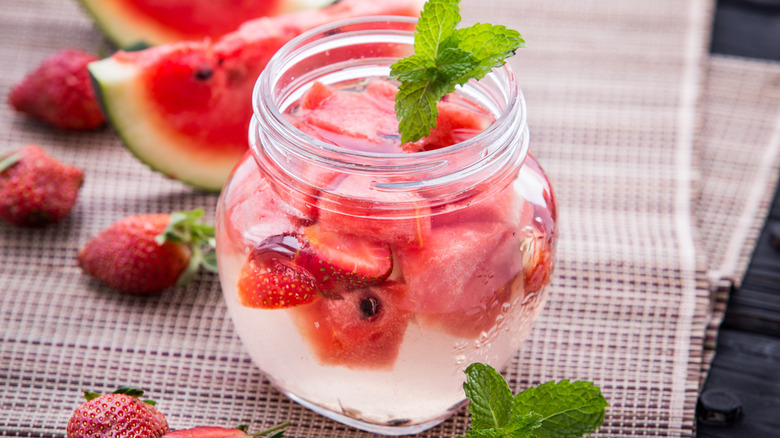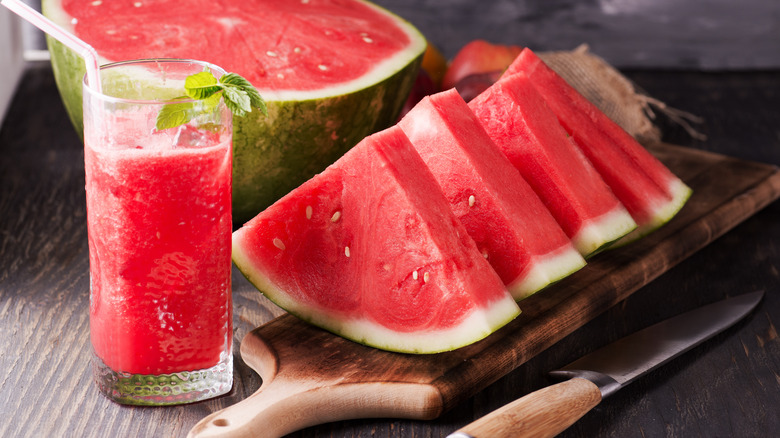Does Eating Watermelon Really Count As Drinking Water?
Eating watermelon does help to keep our bodies hydrated, for the very simple reason that watermelon, like many fruits and vegetables, is mostly made up of water. In the case of watermelon, the proportion of water weight is 92%, meaning it's more hydrating than most other produce (cucumbers and lettuce are 95% and 96% water respectively, however). But watermelon isn't just hydrating — it's also rich in electrolytes.
So does that mean eating watermelon is the same as drinking water in terms of hydration? Not exactly. Food does provide a significant portion of the hydration we need each day. In the U.S., for example, it's believed that we get about 22% of our daily hydration from food, per a 2010 study published in Nutrition Reviews. As for the rest, that's mostly provided by plain old water, even when it comes in the form of beverages like coffee or tea.
But it's not exactly like we can replace the hydrating effects of water by simply eating more watermelon, as going even a few days without water can have deadly effects, according to the Nutrition Reviews study.
How much of our hydration needs can be filled by watermelon?
There's a limit to how much of our needed daily hydration can be sourced via watermelon, or the other best fruits for hydration. Even assuming a diet rich in water-rich fruits and vegetables, it's unlikely these foods could ever account for more than 40% of our necessary daily intake, notes Hydration for Health.
Our bodies still need water (and lots of it) in liquid form. The Academy of Nutrition and Dietetics recommends between 11.5 and 15.5 cups of water daily, depending on sex. That number does include water sourced from food, but even if we assume the 40% limit, that still leaves a minimum of seven cups of water per day (or seven servings of eight fluid ounces) we need to drink to remain healthy.
Of course, our daily food intake isn't all going to come from watermelon either. Watermelon may taste wonderful, but nobody is choosing to subsist on it to the exclusion of all other foods. So as nutritious as it is, and as filled with hydration-aiding electrolytes, watermelon isn't the same as water (even though that's mostly what it is). But yes, it will help to meet at least some of your daily hydration needs.
Why watermelon is such an amazing fruit, vegetable, and berry
Watermelon is a remarkable fruit, and it's also a remarkable berry (yes, it's weird, but we have to accept that it's true). It's even the state vegetable in Oklahoma, which is even weirder. It's definitely not the same as water, though, as already noted. But it does help to hydrate us as well as provide a host of other nutritional benefits.
For instance, watermelon is associated with heart health and lower blood pressure, per WebMD. The former is thanks to its high levels of lycopene, a carotene associated with foods with vibrant red flesh like watermelon that may reduce the danger of heart attacks. Watermelon is also notable for the presence of citrulline, an amino acid thought to be responsible for the fruit's (or vegetable's, in Oklahoma) effectiveness in regulating blood pressure.
Watermelon is also blessedly free of many of the things we worry about, like fat, sodium, and cholesterol. It's even low in calories. So by all means enjoy as much watermelon as you'd like. Just don't forget to drink your daily water, too.



